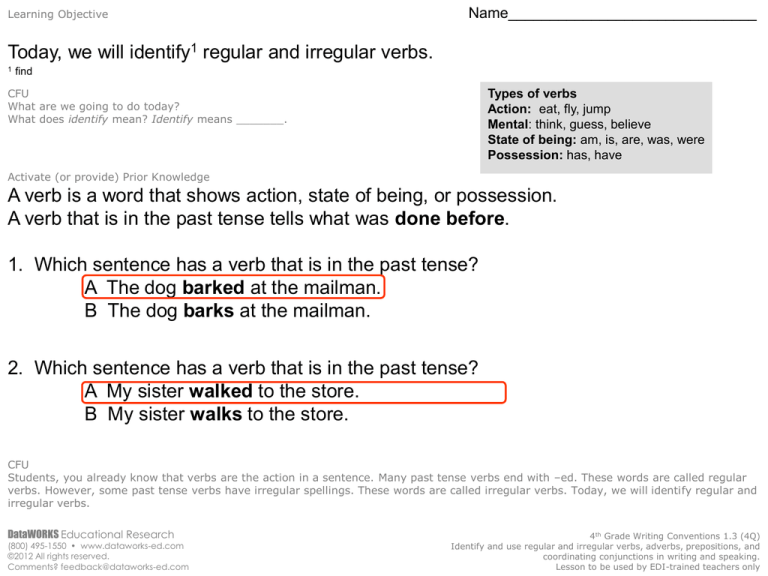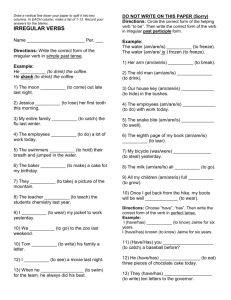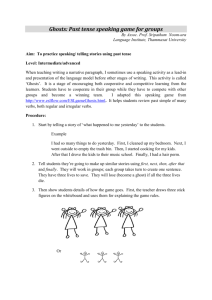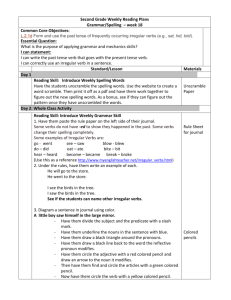
Learning Objective
Name______________________________
Today, we will identify1 regular and irregular verbs.
1
find
CFU
What are we going to do today?
What does identify mean? Identify means _______.
Types of verbs
Action: eat, fly, jump
Mental: think, guess, believe
State of being: am, is, are, was, were
Possession: has, have
Activate (or provide) Prior Knowledge
A verb is a word that shows action, state of being, or possession.
A verb that is in the past tense tells what was done before.
1. Which sentence has a verb that is in the past tense?
A The dog barked at the mailman.
B The dog barks at the mailman.
2. Which sentence has a verb that is in the past tense?
A My sister walked to the store.
B My sister walks to the store.
CFU
Students, you already know that verbs are the action in a sentence. Many past tense verbs end with –ed. These words are called regular
verbs. However, some past tense verbs have irregular spellings. These words are called irregular verbs. Today, we will identify regular and
irregular verbs.
DataWORKS Educational Research
(800) 495-1550 • www.dataworks-ed.com
©2012 All rights reserved.
Comments? feedback@dataworks-ed.com
4th Grade Writing Conventions 1.3 (4Q)
Identify and use regular and irregular verbs, adverbs, prepositions, and
coordinating conjunctions in writing and speaking.
Lesson to be used by EDI-trained teachers only
Concept Development
A regular verb in the past tense ends in -ed.
• To form the past tense, add –ed to the regular verb.
• To form the past tense of regular verbs that end in “e”, add -d.
Regular Verb
Past Tense Form
Examples
jump
jumped
Jill jumped in the pool last night.
skate
skated
Jason skated to the park yesterday.
An irregular verb forms the past tense without adding -ed.
Irregular
Types
Change the
vowel
Add/change
final letter
to (t)
Make no
change at
all
Go to Skill Dev. #1
Irregular
Verb
Past Tense
Form
ride
sing
rode
sang
I rode my bike to school last week.
The bird sang outside my window this morning.
build
spend
built
spent
Gabriel built a sand castle last week.
Sam spent all his free time reading.
put
fit
put
fit
Examples
Yesterday, I put three pens on the table.
Last year, Frank fit into those shoes.
CFU #1
How is the regular verb cook changed to the past tense? How do you know? A add -d B add –ed
How is the regular verb bake changed to the past tense? How do you know? A add -d B add –ed
A has a pair of regular verbs because _____.
Which pair of words are regular verbs? How do you know? Letter ___
A talk, talked
Go to Skill Dev. #2
B drink, drank
CFU #2
B
Which pair of words are irregular verbs? Letter ___ has a pair of irregular verbs because _____.
A walk, walked
B draw, drew
In your own words, what is the difference between a regular verb and an irregular verb?
The difference between a regular and irregular verb is _________________________.
DataWORKS Educational Research
(800) 495-1550 • www.dataworks-ed.com
©2012 All rights reserved.
Comments? feedback@dataworks-ed.com
4th Grade Writing Conventions 1.3 (4Q)
Identify and use regular and irregular verbs, adverbs, prepositions, and
coordinating conjunctions in writing and speaking.
Lesson to be used by EDI-trained teachers only
Skill Development/ Guided Practice #1
A regular verb in the past tense ends in –ed.
An irregular verb forms the past tense without adding -ed.
Regular Verbs
add –ed
add –d
the vowel changes
jump/jumped
skate/skated
ride/rode
Identify regular and irregular verbs.
Step #1: Read the present and past tense verbs.
a. Identify the change to the verb. (underline)
b. Determine the type of verb. (circle)
c. Justify2 your answer.
Step #2: Read the sentences. Hint: Underline time clue words.
a. Use the correct verb tense in each sentence. (write)
2
Irregular Verbs
final letter to a –t
build/built
no change
put/put
CLUE WORDS
PAST TENSE: before, yesterday, last,
earlier, in the past
explain
1. remind / reminded
The verb ___________
reminded is regular / irregular because in the past tense, _________________
-ed is added.
I always ________
remind my sister to lock the doors. Mom ___________
reminded us to lock the doors last night.
2. brush / brushed
The verb ____________is
regular / irregular because in the past tense, _____________________.
brushed
-ed is added.
brushed
I ___________
brush my hair every morning. My sister ______________her hair before the picture.
3. provide / provided
-d is added.
provided is regular / irregular because in the past tense, __________________
The verb ____________
provided
provide
The rivers __________more
water last spring. The rivers ____________mountain
water to the valley.
4. argue / argued
-d is added.
The verb __________
is regular / irregular because in the past tense, ________________________.
argue
The senators ________
______about the best way to save water.
argued yesterday about water use. Citizens argue
CFU
(#1a) How did I/you identify changes to the verb in the past tense?
(#2) How did I/you determine the type of verb?
(#1c) How did I/you justify why the verb was regular or irregular?
(#2a) How did I/you use the correct verb in each sentence?
DataWORKS Educational Research
(800) 495-1550 • www.dataworks-ed.com
©2012 All rights reserved.
Comments? feedback@dataworks-ed.com
Back to Concept Dev.
4th Grade Writing Conventions 1.3 (4Q)
Identify and use regular and irregular verbs, adverbs, prepositions, and
coordinating conjunctions in writing and speaking.
Lesson to be used by EDI-trained teachers only
Skill Development/ Guided Practice #2
Regular Verbs
A regular verb in the past tense ends in -ed.
An irregular verb forms the past tense without adding -ed.
Identify regular and irregular verbs.
Step #1: Read the present and past tense verbs.
a. Identify the change to the verb. (underline)
b. Determine the type of verb. (circle)
c. Justify your answer.
Step #2: Read the sentences. Hint: Underline time clue words.
a. Use the correct verb tense in each sentence. (write)
add –ed
jump/jumped
add –d
skate/skated
Irregular Verbs
the vowel changes
ride/rode
CFU
(#1a) How
(#1b) How
(#1c) How
(#2a) How
did I/you
did I/you
did I/you
did I/you
final letter to a –t
build/built
no change
put/put
identify changes to the verb in the past tense?
determine the type of verb?
justify why the verb was regular or irregular?
use the correct verb in each sentence?
5. know / knew
The verb ________is
regular / irregular because in the past tense, ________________________.
o changes to e.
knew
I ________
know all my multiplication facts. The boy ________
knew his multiplication facts before the test.
6. come / came
The verb came
______is regular / irregular because in the past tense, ________________________.
o changes to a.
came to my birthday party last week. I hope you can _______
come to my birthday party.
Braxton ________
CLUE WORDS
PAST TENSE:
before, yesterday, last,
earlier, in the past
7. bend / bent
d changes to t.
The verb ______is
bent regular / irregular because in the past tense, ________________________.
He ________
bent the straw earlier to drink through it. I _______
bend the straw to fit in the cup.
8. spend / spent
d changes to t.
The verb ________is
regular / irregular because in the past tense, ________________________.
spent
spent
People _________
hours studying exercise.
spend a lot of energy on exercising. Last week, scientists __________ten
9. hit / hit
The verb ______is
regular / irregular because in the past tense, ________________________.
no change.
hit
Light rays from the sun ____
earth yesterday.
hit
hit the earth. A big solar flare _____the
10. put / put
The verb ________is
regular / irregular because in the past tense, ______________________
no change.
put
Factories _____
put a new battery in her laptop.
put energy into batteries. Last week my mom _____
DataWORKS Educational Research
(800) 495-1550 • www.dataworks-ed.com
©2012 All rights reserved.
Comments? feedback@dataworks-ed.com
4th Grade Writing Conventions 1.3 (4Q)
Identify and use regular and irregular verbs, adverbs, prepositions, and
coordinating conjunctions in writing and speaking.
Lesson to be used by EDI-trained teachers only
Relevance
A regular verb in the past tense ends in -ed.
An irregular verb forms the past tense without adding -ed.
1. Identifying regular and irregular verbs will help you speak and write more clearly, especially
in school.
Unclear sentences: Angela dance yesterday. She spend money on shoes.
Clear sentences: Angela danced yesterday. She spent money on shoes.
2. Identifying regular and irregular verbs will help you do well on tests.
CFU
Does anyone else have another reason why it is relevant to identify regular and irregular verbs? (pair-share) Why is it relevant to identify
regular and irregular verbs? You may give me one of my reasons or one of your own. Which reason is more relevant to you? Why?
DataWORKS Educational Research
(800) 495-1550 • www.dataworks-ed.com
©2012 All rights reserved.
Comments? feedback@dataworks-ed.com
4th Grade Writing Conventions 1.3 (4Q)
Identify and use regular and irregular verbs, adverbs, prepositions, and
coordinating conjunctions in writing and speaking.
Lesson to be used by EDI-trained teachers only
A regular verb in the past tense ends in -ed.
An irregular verb forms the past tense without adding -ed.
Regular Verbs
Skill Closure
Identify regular and irregular verbs.
add –ed
jump/jumped
add –d
skate/skated
Step #1: Read the present and past tense verbs.
Irregular Verbs
a. Identify the change to the verb. (underline)
the vowel changes
final letter to a –t no change
b. Determine the type of verb. (circle)
ride/rode
build/built
put/put
c. Justify your answer.
Step #2: Read the sentences. Hint: Underline time clue words.
CLUE WORDS
PAST
TENSE:
before, yesterday, last,
a. Use the correct verb tense in each sentence. (write)
earlier, in the past
1. answer / answered
-ed is added.
The verb ____________is
regular / irregular because in the past tense, ____________________
answered
I always __________
answer my teacher’s questions. I ___________
answered three questions earlier.
2. ride / rode
i changes to o.
The verb ______is
regular / irregular because in the past tense, ________________________.
rode
Last week I ______
ride in gas-powered cars.
rode in a hybrid car that uses gas and electric fuel. Most people _______
Concept Closure
Why is Jason skate to the park yesterday not an example of correct past tense? Explain.
____________________________________________________________________________________
____________________________________________________________________________________
Summary Closure
What did you learn today about identifying regular and irregular verbs?
Day 1 ____________________________________________________________________________________
Day 2 ____________________________________________________________________________________
DataWORKS Educational Research
(800) 495-1550 • www.dataworks-ed.com
©2012 All rights reserved.
Comments? feedback@dataworks-ed.com
4th Grade Writing Conventions 1.3 (4Q)
Identify and use regular and irregular verbs, adverbs, prepositions, and
coordinating conjunctions in writing and speaking.
Lesson to be used by EDI-trained teachers only
Independent Practice
A regular verb in the past tense ends in -ed.
An irregular verb forms the past tense without adding -ed.
Identify regular and irregular verbs.
Step #1: Read the present and past tense verbs.
a. Identify the change to the verb. (underline)
b. Determine the type of verb. (circle)
c. Justify your answer.
Step #2: Read the sentences. Hint: Underline time clue words.
a. Use the correct verb tense in each sentence. (write)
Name __________________________
Regular Verbs
add –ed
jump/jumped
add –d
skate/skated
Irregular Verbs
the vowel changes
final letter
ride/rode
to a –t
build/built
no
change
put/put
CLUE WORDS
PAST TENSE: before, yesterday, last,
earlier, in the past
1. count / counted
The verb __________is
regular / irregular because in the past tense, ________________________.
-ed is added.
counted
Later, I _________
counted how many video games I have. I ________
count my baseball cards daily.
2. hurt / hurt
hurt regular / irregular because in the past tense, _______________________
The verb ______is
no change.
Beaver dams _____
hurt by beaver dams.
hurt some animals. Animals that fish in the stream were _____
3. dig / dug
i changes to u.
The verb ______is
regular / irregular because in the past tense, _______________________
dug
dig burrows to stay out of the sun. A lizard dug
Desert animals ____
____ under the sand earlier.
4. glue / glued
The verb __________is
regular / irregular because in the past tense, ________________________
glued
-d is added.
glue
They __________
maps and old pictures last. The students ________ pictures in a history album.
glued
5. know / knew
o changes to e.
knew
The verb ________is
regular / irregular because in the past tense, ________________________.
Sal did not ______
______ they gave off heat and light.
know candles give off gas and smoke. Before, Sal knew
6. build / built
d changes to t.
The verb ________is
regular / irregular because in the past tense, ________________________
built
They ________
a big fort yesterday. Adam and Adrian like to _______
built
build forts in the snow.
DataWORKS Educational Research
(800) 495-1550 • www.dataworks-ed.com
©2012 All rights reserved.
Comments? feedback@dataworks-ed.com
4th Grade Writing Conventions 1.3 (4Q)
Identify and use regular and irregular verbs, adverbs, prepositions, and
coordinating conjunctions in writing and speaking.
Lesson to be used by EDI-trained teachers only
Periodic Review 1
A regular verb forms the past tense by adding -ed.
An irregular verb forms the past tense without adding -ed.
Identify regular and irregular verbs.
Step #1: Read the present and past tense verbs.
a. Identify the change to the verb. (underline)
b. Determine the type of verb. (circle)
c. Justify your answer.
Step #2: Read the sentences. Hint: Underline time clue words.
a. Use the correct verb tense in each sentence. (write)
Name __________________________
Regular Verbs
add –ed
add –d
jump/jumped
skate/skated
Irregular Verbs
the vowel changes
final letter
no
ride/rode
to a –t
change
build/built
put/put
CLUE WORDS
PAST TENSE: before, yesterday, last,
earlier, in the past
1. mean / meant
n changes to t.
meant
The verb _________is
regular/irregular because in the past tense, ________________________.
mean no harm when I say that. I ___________
meant
I ________
no harm when I said that yesterday.
2. boil / boiled
-ed is added.
The verb __________is
regular/irregular because in the past tense, ________________________.
boiled
boil
Last night, we __________
eggs for the salad. I ________eggs
to put in the salad.
boiled
3. set / set
set is regular/irregular because in the past tense, ________________________.
no change.
The verb ______
I _____the
books down. Juan ______
set
set the books down earlier and forgot about them.
4. begin / began
i changes to a.
The verb _________is
regular/irregular because in the past tense, ________________________.
began
began
I __________
my homework one hour ago. I __________my
homework when I get home.
begin
5. move / moved
The verb __________
is regular/irregular because in the past tense, ________________________.
-d is added.
moved
move
moved
Now, I ________
my head to see the TV. Before, Pedro _________the
TV to see it better.
DataWORKS Educational Research
(800) 495-1550 • www.dataworks-ed.com
©2012 All rights reserved.
Comments? feedback@dataworks-ed.com
4th Grade Writing Conventions 1.3 (4Q)
Identify and use regular and irregular verbs, adverbs, prepositions, and
coordinating conjunctions in writing and speaking.
Lesson to be used by EDI-trained teachers only
Periodic Review 2
A regular verb in the past tense ends in -ed.
An irregular verb forms the past tense without adding -ed.
Identify regular and irregular verbs.
Step #1: Read the present and past tense verbs.
a. Identify the change to the verb. (underline)
b. Determine the type of verb. (circle)
c. Justify your answer.
Step #2: Read the sentences. Hint: Underline time clue words.
a. Use the correct verb tense in each sentence. (write)
Name __________________________
Regular Verbs
add –ed
add –d
jump/jumped
skate/skated
Irregular Verbs
the vowel changes
final letter
no
ride/rode
to a –t
change
build/built
put/put
CLUE WORDS
PAST TENSE: before, yesterday, last,
earlier, in the past
1. stick / stuck
stuck
The verb ________is
regular/irregular because in the past tense, ________________________.
i changes to u.
stuck
stick
She __________her
gum there yesterday! I _________my
gum behind my ear.
2. swell / swelled
swelled
-ed is added.
The verb __________is
regular/irregular because in the past tense, ________________________.
swelled
I __________up
from a bee sting. My arm __________up
after the sting last week.
swell
3. deal / dealt
dealt
l changes to t.
The verb _________is
regular/irregular because in the past tense, ________________________.
deal
I ________the
cards fast. I _________the
cards last turn.
dealt
4. share / shared
shared
The verb __________is
regular/irregular because in the past tense, ________________________.
-d is added.
shared
share
The boys ____________a
pizza earlier. The toddler did not _________his
toys.
5. let / let
no change.
The verb ______is
regular/irregular because in the past tense, ________________________.
let
let
let
I _______my
rabbit hop around the yard. Yesterday, I _____the
rabbit out of its cage.
DataWORKS Educational Research
(800) 495-1550 • www.dataworks-ed.com
©2012 All rights reserved.
Comments? feedback@dataworks-ed.com
4th Grade Writing Conventions 1.3 (4Q)
Identify and use regular and irregular verbs, adverbs, prepositions, and
coordinating conjunctions in writing and speaking.
Lesson to be used by EDI-trained teachers only
Periodic Review 3
A regular verb in the past tense ends in -ed.
An irregular verb forms the past tense without adding -ed.
Identify regular and irregular verbs.
Step #1: Read the present and past tense verbs.
a. Identify the change to the verb. (underline)
b. Determine the type of verb. (circle)
c. Justify your answer.
Step #2: Read the sentences. Hint: Underline time clue words.
a. Use the correct verb tense in each sentence. (write)
Name __________________________
Regular Verbs
add –ed
add –d
jump/jumped
skate/skated
Irregular Verbs
the vowel changes
final letter to a
no
ride/rode
–t
change
build/built
put/put
CLUE WORDS
PAST TENSE: before, yesterday, last,
earlier, in the past
1. win / won
i changes to o.
The verb _______is
regular/irregular because in the past tense, ________________________.
won
Last weekend, I ________a
trophy at the track meet. I usually _______
win a trophy.
won
2. send / sent
The verb ________is
regular/irregular because in the past tense, ________________________.
sent
d changes to t.
I ________my
kids to camp last summer. I _______my
kids to camp every summer.
sent
send
3. command / commanded
commanded regular/irregular because in the past tense, ________________________.
The verb ____________is
-ed is added.
commanded
command
I _____________the
officer loudly. I _______________the officer earlier.
4. beat / beat
The verb _______is
regular/irregular because in the past tense, ________________________.
beat
no change.
beat
beat
My mom _______the
rug. Last Saturday, we ________the
other team!
5. whine / whined
whined
-d is added.
The verb __________is
regular/irregular because in the past tense, ________________________.
whined
whine
Liana ___________in
the past when told no. Do not _________about
chores.
DataWORKS Educational Research
(800) 495-1550 • www.dataworks-ed.com
©2012 All rights reserved.
Comments? feedback@dataworks-ed.com
4th Grade Writing Conventions 1.3 (4Q)
Identify and use regular and irregular verbs, adverbs, prepositions, and
coordinating conjunctions in writing and speaking.
Lesson to be used by EDI-trained teachers only
EDI – Cognitive, Teaching and English Learners Strategies
Learning Objective :Today, we will identify regular and irregular verbs.
Cognitive Strategies
Teaching Strategies
Elaboration
Demonstration
Targeted vocabulary: identify, regular verb, irregular verb, justify
Language Strategies
Vocabulary Words
Academic
identify, justify
Content
regular verb, irregular verb
Support
Multiple-Meaning
Synonym
Vocabulary
Strategy
Definition
identify, justify, regular verb, irregular verb
Homophone
Internal Context Clue
Listen, Speak
Read
Similar Sounds
Tracked Reading
Decoding Rules
Write
Writing
Content Access Strategies
Comprehensible
Input
Cognates
Graphic Organizer
Contextual Clues
Contextualized
Definitions
Pictures
DataWORKS Educational Research
(800) 495-1550 • www.dataworks-ed.com
©2012 All rights reserved.
Comments? feedback@dataworks-ed.com
4th Grade Writing Conventions 1.3 (4Q)
Identify and use regular and irregular verbs, adverbs, prepositions, and
coordinating conjunctions in writing and speaking.
Lesson to be used by EDI-trained teachers only
Blank Page
DataWORKS Educational Research
(800) 495-1550 • www.dataworks-ed.com
©2012 All rights reserved.
Comments? feedback@dataworks-ed.com
4th Grade Writing Conventions 1.3 (4Q)
Identify and use regular and irregular verbs, adverbs, prepositions, and
coordinating conjunctions in writing and speaking.
Lesson to be used by EDI-trained teachers only







